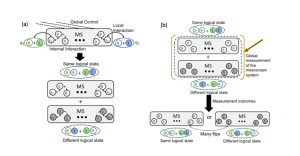Summary
Mesoscopic systems provide a new tool for quantum systems design. In particular, they are enabling of robust quantum control. Here “mesoscopic system” refers to a connected network where each element, if studied alone, would be a quantum bit. The network is too big to be treated fully quantum mechanically. We do not have individual control over each element and we measure collective properties of the network. However, the network retains quantum coherence and behaves in a uniquely quantum fashion. In this project, we design a novel protocol using an intermediate mesoscopic system to control and interconnect non-interacting qubits. Our method aims to create entanglement between two separated qubits; a pure quantum correlation between the target qubits that provides a measure of the mesoscopic system’s quantum capacity. Over the course of this project, we will develop new theory and experimental tools. Ultimately, we expect our work will lead to innovative design elements for use in quantum processor architectures and quantum measurement devices.

Figure 1: The summary of the entangling protocol: (a) The experimentally available control tools are used to correlate two joint logical states of the target with two very distinct collective states of the mesoscopic system, (b) A low-resolution global measurement over the mesoscopic system discerns between the distinct collective states of the mesoscopic system. This measurement updates the state of the qubits into one of the two logical joint states, each with a probability of ½, along with the state of the mesoscopic system. Both of these joint logical states are maximally entangled quantum states between the target qubits.
Related Content

Zero-Dimensional Quantum Materials for the Next Generation of Highly-Selective Chemical Sensors
Summary Heavy metals are a major public health concern and their on-site detection in water supplies is not well served by existing lab techniques. We develop a new multi-modal platform comprising functionalized quantum dots of two-dimensional materials (2D-QDs) for the sensing of four highly-toxic heavy metal pollutants (arsenic, cadmium, lead and mercury). The zero-dimensional […]
March 11, 2019

Quantum Sensing with Small Quantum Systems
Summary There are small quantum systems over which we have very good control and which have long lifetimes. Examples include the phosphorous (P) defect in silicon (Si) and the nitrogen vacancy (NV) defect in diamond. With P defect in Si, we focus on improving our understanding of the hyperpolarization mechanism to better enable engineering of […]
December 1, 2016

Two-Dimensional Quantum Materials and Heterostructures
Two-dimensional (2D) layers just one atom thick can be stripped from certain materials, such as graphene.
June 1, 2017

Silicon Platform for Electron Spin Qubits
Summary Scaling solid-state quantum processors to a useful threshold while maintaining the requisite precision in quantum control remains a challenge. We propose a quantum metal-oxide-semiconductor (QMOS) architecture operating at cryogenic temperatures that is based on a network/node approach as a means to scalability. By working with QMOS, we benefit from the deep investments and […]
December 7, 2018

